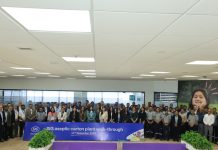The Toyota Mobility Foundation (TMF), a non-profit Foundation established by Toyota Motor Corporation, will cooperate with the Bali Provincial Government for its Sustainable Mobility Advancing Real Transformation (SMART) @Ubud Program, a 6-month closed eco-system trial from September 2023 to February 2024. The program is co-organized by Deloitte Future of Mobility Solution Centre (Deloitte)*1, with the support of the Transport Department of Provincial Government of Bali and Toyota Indonesia. The goal of the program, as outlined in the Letter of Intent (LOI) from the Bali Provincial Government to TMF, is to encourage sustainable mobility through efficient usage of data-driven and electrified transport solutions.
*1 Deloitte Future of Mobility (FoM) Solution Center, located in Singapore, addresses global mobility challenges, and develops new solutions and assets for the ecosystem as it undergoes an unprecedented transformation.
During this trial, TMF will be making an investment of USD 1.7 million (IDR 26 billion) to conduct the trial of two mobility solutions in Ubud, Bali:
The first solution being the introduction of ten units of an on-demand xEV shuttle service to operate in the Central Ubud Area, with multiple stops that are all located within a 10-minute walking distance from key tourist destinations and popular local sites;
The second solution being the installation of nine digital display monitors along high-traffic bus stops within the Trans Metro Dewata Route, providing real time visualization of bus schedules for commuters, allowing for greater convenience, especially when used in conjunction with the first solution.
In addition to implementing these two solutions, TMF will engage in capacity building initiatives, with the end goal of developing concrete recommendations to create a potentially sustainable and viable business models tailored to the local community, and thereby enhance the state of mobility in Ubud by reducing air pollution, alleviating traffic congestion, and promoting the use of electrified public transportation. Furthermore, the recommendations are aimed at allowing governments and any interested parties to scale and replicate the model across Bali, Indonesia and beyond.
Background
This project marks the continuation of Toyota’s involvement as an electrified solution provider during G20 and is a showcase of its constant commitment to the Indonesian society. TMF selected Ubud in Bali, Indonesia as the ideal location for project implementation due to its prominence as a leading tourist destination, as identified by the Republic of Indonesia, in addition to its commitment to sustainability and its closed ecosystem being an ideal environment for trial implementations.
In addition, SMART @Ubud aligns with Bali’s designation as a target zone for electrified vehicles and the broader objectives of Bali Province’s 2026 electric mobility plan. Through the SMART @Ubud project, TMF seeks to understand the appropriate conditions and requirements to scale electrified vehicles. It understands that there are multiple pathways to electrification, and aims to support the Bali government in determining the ideal cases and archetypes for each powertrain, in order to make further progress towards the shared goal of decarbonization.
Solution Overview
The solutions to be implemented for the SMART @Ubud project include:
Solution 1 Smart xEV Shuttle Services (SMART Shuttle @Ubud) supported by a booking app developed by SWAT Mobility, designed to enhance the convenience of tourist and resident transportation. To enable the service, passengers download a passenger application and select the pick-up and drop-off points from predetermined stops. Five battery electric vehicles and five hybrid electric vehicles will be deployed free-of-charge during the trial, and the on demand operations will be run in collaboration with the Ubud Community.
Solution 2 Dynamic Bus Schedule Displays developed by Papercast and customized considering the needs of the local community, able to visualize estimated arrival times of the Trans Metro Dewata bus. The solution was designed to increase public bus utilization, while allowing for greater convenience and efficiency for passengers by visualizing bus timetables, maps, and other Point of Interest advertisements. Additionally, this solution will be linked to the SMART Shuttle @Ubud to enhance the ability for the customer to better plan their overall journey.
Remarks
Pras Ganesh, Executive Program Director of the Toyota Mobility Foundation noted, “TMF designed this project to meet its three principles, (1) Sustainability, ensuring solutions are able to improve the quality of life of the residents of Bali in an environmentally and economically sustainable manner, (2) Innovation, encouraging introduction of novel data-driven and electrified solutions, including HEV and BEV, and (3) Partnership, empowering local stakeholders to continue solutions even beyond TMF involvement by providing capacity building activities that are aligned to real local needs. We are working towards creating a blueprint of a sustainable business model that will allow the community of Ubud to scale the impact achieved during this trial. We are excited to launch this solution alongside all our partners, who are likeminded with the aims of promoting the concept of mobility for all and carbon neutrality.”
About Toyota Mobility Foundation
The Toyota Mobility Foundation (TMF) was established in August 2014 by the Toyota Motor Corporation (TMC) to support the development of a more mobile society in which everyone can move freely. The Foundation underscores TMC’s on-going commitment to continuous improvement and respect for people. It utilizes Toyota’s expertise and technologies to support strong mobility systems while eliminating disparities in mobility. TMF works in partnership with universities, governments, non-profits, research institutions and other organizations, creating programs are aligned with the UN Sustainable Development Goals (SDGs) to address mobility issues around the world.
Moving forward, the Toyota Group will continue to utilize the technologies and know-how it has cultivated through its business activities as well as through collaboration with various partners, to promote activities in line with the concept of the SDGs (Sustainable Development Goals) set by the United Nations. Overall, the Toyota Group aims to contribute to building a society where all individuals and communities can live joyfully and prosperously.





